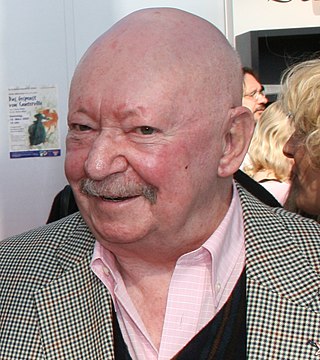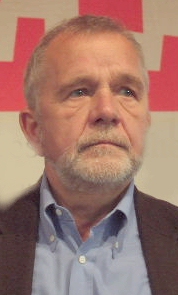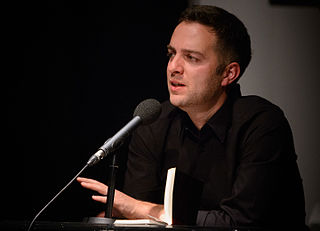Related Research Articles

Claudio Magris is an Italian scholar, translator and writer. He was a senator for Friuli-Venezia Giulia from 1994 to 1996.

Sibylle Berg is a Swiss contemporary author and playwright. They write novels, essays, short fiction, plays, radio plays, and columns. Their 15 books have been translated into 30 languages. They have won numerous awards, including the Thüringer Literaturpreis, the Bertolt-Brecht-Literaturpreis, and the Johann-Peter-Hebel-Preis. They have become an iconic figure in German alternative sub-cultures, gaining a large fan base among the LGBT community and the European artistic communities. They live in Switzerland and Israel. Their 2019 work GRM: Brainfuck, a science fiction novel set in a dystopian near future won the Swiss Book Prize, and reached fourth place on the Spiegel Bestseller list, with the sequel, RCE, entering the list at place 14.
The Toucan Prize is a literary prize given by the city of Munich to the best new publication by a Munich author. It has been awarded since 1965 and is endowed with 6,000 Euros.

Günter Kunert was a German writer. Based in East Berlin, he published poetry from 1947, supported by Bertold Brecht. After he had signed a petition against the deprivation of the citizenship of Wolf Biermann in 1976, he lost his SED membership, and moved to the West two years later. He is regarded as a versatile German writer who wrote short stories, essays, autobiographical works, film scripts and novels. He received international honorary doctorates and awards.

Ulrich Peltzer is a German novelist.

Peter von Matt is a Swiss philologist and author.
The German Book Prize is awarded annually, in October, by the German Publishers and Booksellers Association to the best new German language novel of the year. The books, published in Germany, Austria and Switzerland, are nominated by their publishers, who can propose up to two books from their current or planned publication list. The books should be in shops before the short-list is announced in September of the award year. The winner is awarded €25,000, while the five shortlisted authors receive €2,500 each. It is presented annually during the Frankfurt Book Fair.

Rüdiger Safranski is a German philosopher and author.

Judith Schalansky is a German writer, book designer and publisher.

Gerhard Rühm is an Austrian author, composer and visual artist.

Ulrike Draesner is a German author. She was awarded the 2016 Nicolas Born Prize.

Fridolin Schley is a German writer. In 2007 he won the Toucan Prize for his novel Wildes schönes Tier, and in 2021 again for Die Verteidigung.

Georges-Arthur Goldschmidt is a French writer and translator of German origin.
Céline Minard is a French writer.

Jan Wagner, is a German poet, essayist and translator, recipient of the Georg Büchner Prize and Leipzig Book Fair Prize.

Esther Kinsky is a German literary translator and the author of novels and poetry.

Martin Schäuble is a German novelist, journalist and writer of non-fiction books. His pen name is Robert M. Sonntag. His works have been translated into several languages.

Peter Hamm was a German poet, author, journalist, editor, and literary critic. He wrote several documentaries, including ones about Ingeborg Bachmann and Peter Handke. He wrote for the German weekly newspapers Der Spiegel and Die Zeit, among others. From 1964 to 2002, Hamm worked as contributing editor for culture for the broadcaster Bayerischer Rundfunk. He was also a jury member of literary prizes, and critic for a regular literary club of the Swiss television company Schweizer Fernsehen.

Norbert Gstrein is an Austrian writer. He was born in Mils in Tyrol, the son of the hotelier and ski school director Norbert Gstrein (1931–1988) and Maria Gstrein, née Thurner. He grews up with his five siblings in Vent and attended the secondary school from 1971 to 1979 in Imst. From 1979 to 1984, Gstrein studied mathematics in Innsbruck, Stanford and Erlangen. He not completed his PhD in 1988 at the University of Innsbruck, under the supervision of Roman Liedl and Gerhard Frey.
The Adenauer-de Gaulle Prize is an award given to French or German figures and institutions that have made an exceptional contribution to French-German cooperation. It is named after Germany's former Chancellor Konrad Adenauer and France's former President Charles de Gaulle. They worked for a reconciliation between the two European countries. This reconciliation was sealed by the Élysée Treaty in 1963. The prize is endowed with €10,000 and awarded alternatively in Germany and France. The award was established on 22 January 1988 by the German and French governments.
References
- ↑ "Franz-Hessel-Preis". memim.com.
- ↑ "Stiftung Genshagen: Franz-Hessel-Preis / Prix Franz-Hessel. ein deutsch-französischer Literaturpreises – Preisverleihung". Archived from the original on 30 January 2016. Retrieved 20 February 2017.
- ↑ "Stiftung Genshagen: Franz-Hessel-Preis / Prix Franz-Hessel . Remise du prix littéraire franco-allemand". Archived from the original on 14 February 2016. Retrieved 20 February 2017.
- ↑ "Franz-Hessel-Preis für Susanne Röckel und Anne-Marie Garat | BuchMarkt". www.buchmarkt.de. 17 May 2019.
- ↑ "Franz-Hessel-Preis verliehen". Webseite der Bundesregierung (in German). 25 March 2022. Retrieved 23 August 2022.
- ↑ "Franz-Hessel-Literaturpreis 2022 für Schley und Desbiolles". Deutschlandfunk Kultur (in German). 12 December 2022. Retrieved 12 December 2022.